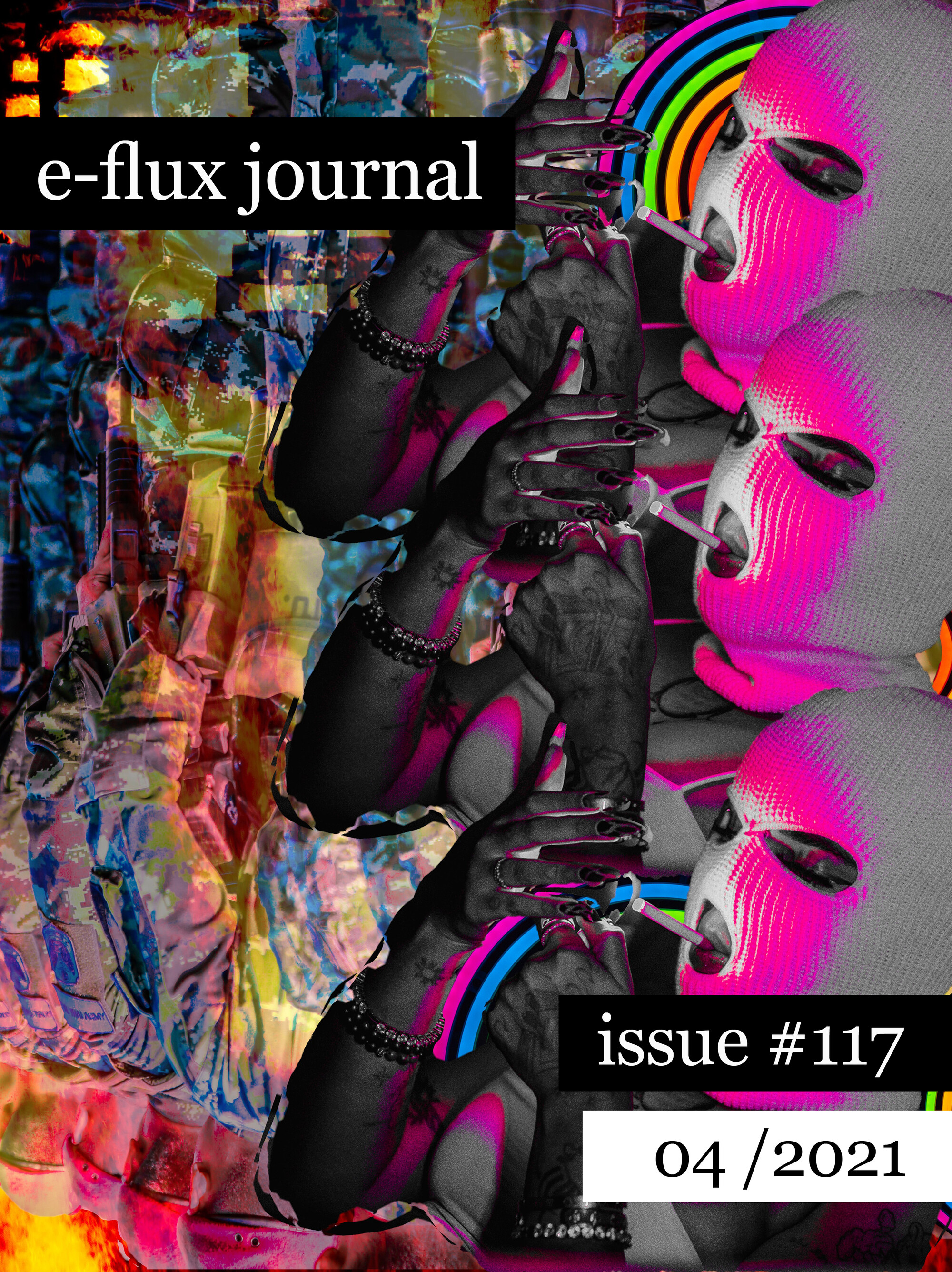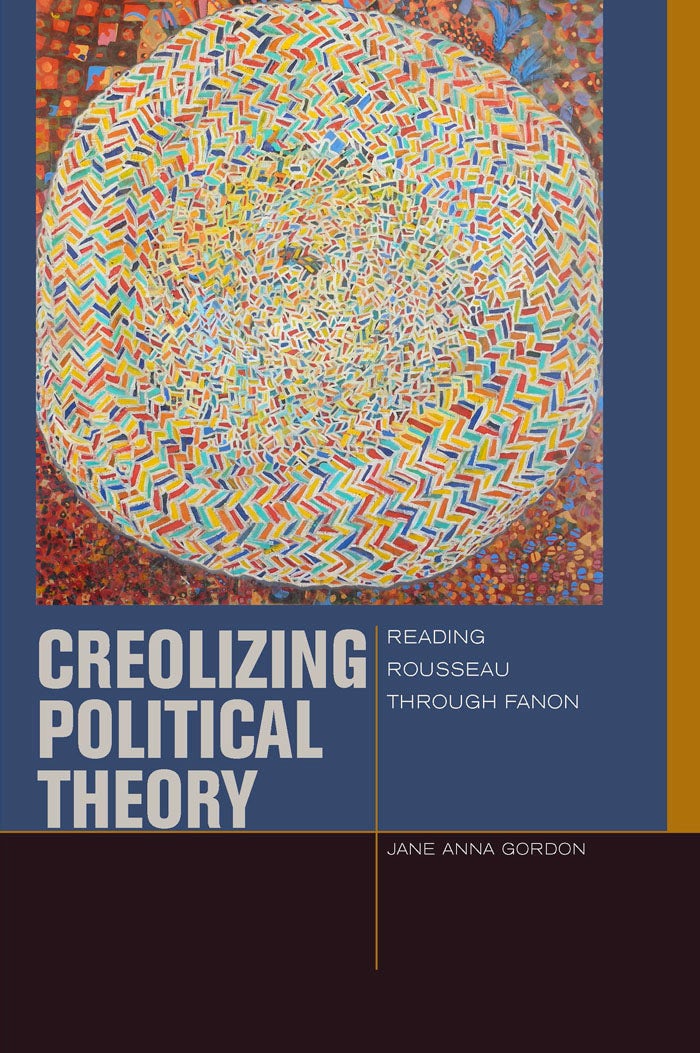e-flux journal, 117: trans | fem | aesthetics (2021)
Filed under journal | Tags: · aesthetics, art, black people, body, colonialism, gender, queer, transgender, women

“Those who make it possible to really live as a trans woman are rarely those who are our representatives to the other, and still less those who appoint themselves among us as the police of our supposed collective identity. Those who make it possible are artists. Not fine artists necessarily, nor writers of “fine writing.” They might work in minor, vernacular forms. They might just be artists of trans life itself. They might be undetectable outside of our little covens of care. They make up stories or images or gestures that elude the limits of what they, and we, were handed. Making it up as they go.”
Contributors: Isabel Sandoval, Jules Gill-Peterson, Rosza Daniel Lang/Levitsky, Bishakh Som, Sultana Isham, Tamarra and Riksa Afiaty, Kira Xonorika, Maxi Wallenhorst, Eva Hayward, McKenzie Wark, Emily Alison Zhou, Comrade Josephine (embodied by Luce deLire).
Edited by McKenzie Wark
Publisher e-flux, New York, April 2021
ISSN 2164-1625
Jane Anna Gordon: Creolizing Political Theory: Reading Rousseau through Fanon (2014)
Filed under book | Tags: · black people, colonialism, creolization, decolonization, freedom, governance, law, modernity, political theory, politics, power, race, theory

“Might creolization offer political theory an approach that would better reflect the heterogeneity of political life? After all, it describes mixtures that were not supposed to have emerged in the plantation societies of the Caribbean but did so through their capacity to exemplify living culture, thought, and political practice. Similar processes continue today, when people who once were strangers find themselves unequal co-occupants of new political locations they both seek to call “home.”
Unlike multiculturalism, in which different cultures are thought to co-exist relatively separately, creolization describes how people reinterpret themselves through interaction with one another. While indebted to comparative political theory, Gordon offers a critique of comparison by demonstrating the generative capacity of creolizing methodologies. She does so by bringing together the eighteenth-century revolutionary Swiss thinker Jean-Jacques Rousseau and the twentieth-century Martinican-born Algerian liberationist Frantz Fanon. While both provocatively challenged whether we can study the world in ways that do not duplicate the prejudices that sustain its inequalities, Fanon, she argues, outlined a vision of how to bring into being the democratically legitimate alternatives that Rousseau mainly imagined.”
Publisher Fordham University Press, New York, 2014
Just Ideas series
ISBN 9780823254811, 082325481X
xv+294 pages
Reviews: Anne Norton, Sharon Stanley, Fred Lee, Thomas Meagher (with author’s response, Contemporary Political Theory, 2018).
See also: Forum on Creolizing Theory (ed. Lewis R. Gordon, Journal of French and Francophone Philosophy, 2017), The Creolization of Education, Pedagogy, and Political Theory (ed. Lewis R. Gordon, Review of Education, Pedagogy, and Cultural Studies, 2018).
October, 174: A Questionnaire on Decolonization (2020)
Filed under survey | Tags: · activism, art, black people, collecting, colonialism, decoloniality, decolonization, eurocentrism, history, imperialism, indigenous peoples, land, museum, postcolonialism, race, slavery, violence
“The term decolonize has gained a new life in recent art activism, as a radical challenge to the Eurocentrism of museums (in light of Native, Indigenous, and other epistemological perspectives) as well as in the museum’s structural relation to violence (either in its ties to oligarchic trustees or to corporations engaged in the business of war or environmental depredation). In calling forth the mid-twentieth-century period of decolonization as its historical point of reference, the word’s emphatic return is rhetorically powerful, and it corresponds to a parallel interest among scholars in a plural field of postcolonial or global modernisms. The exhortation to decolonize, however, is not uncontroversial-some believe it still carries a Eurocentric bias. Indeed, it has been proposed that, for the West, de-imperialization is perhaps even more urgent than decolonization.
What does the term decolonize mean to you in your work in activism, criticism, art, and/or scholarship? Why has it come to play such an urgent role in the neoliberal West? How can we link it historically with the political history of decolonization, and how does it work to translate postcolonial theory into a critique of the neocolonial contemporary art world?”
Respondents include Nana Adusei-Poku, Brook Andrew, Sampada Aranke, Ian Bethell-Bennett, Kader Attia, Andrea Carlson, Elise Y. Chagas, ISUMA, Iftikhar Dadi, Janet Dees, Nitasha Dhillon, Hannah Feldman, Josh T. Franco, David Garneau, Renee Green, Iman Issa, Arnold J. Kemp, Thomas Lax, Nancy Luxon, Nelson Maldonado-Torres, Saloni Mathur, Tiona Nekkia McClodden, Alan Michelson, Partha Mitter, Isabela Muci Barradas, Steven Nelson, Ugochukwu-Smooth C. Nzewi, Alessandro Petti, Paulina Pineda, Christopher Pinney, Elizabeth Povinelli, Ryan Rice, Andrew Ross, Paul Chaat Smith, Nancy Spector, Francoise Verges, Rocio Zambrana, and Joseph R. Zordan.
Edited by Huey Copeland, Hal Foster, David Joselit, and Pamela M. Lee
Publisher MIT Press, Fall 2020
Open access
ISSN 0162-2870
123 pages

